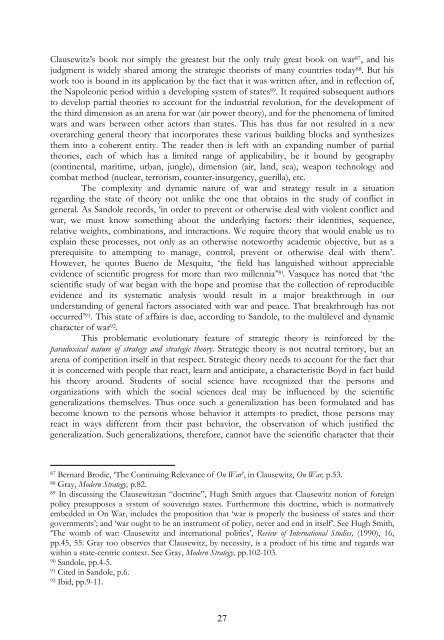Science, Strategy and War The Strategic Theory of ... - Boekje Pienter
Science, Strategy and War The Strategic Theory of ... - Boekje Pienter
Science, Strategy and War The Strategic Theory of ... - Boekje Pienter
You also want an ePaper? Increase the reach of your titles
YUMPU automatically turns print PDFs into web optimized ePapers that Google loves.
Clausewitz’s book not simply the greatest but the only truly great book on war 87 , <strong>and</strong> hisjudgment is widely shared among the strategic theorists <strong>of</strong> many countries today 88 . But hiswork too is bound in its application by the fact that it was written after, <strong>and</strong> in reflection <strong>of</strong>,the Napoleonic period within a developing system <strong>of</strong> states 89 . It required subsequent authorsto develop partial theories to account for the industrial revolution, for the development <strong>of</strong>the third dimension as an arena for war (air power theory), <strong>and</strong> for the phenomena <strong>of</strong> limitedwars <strong>and</strong> wars between other actors than states. This has thus far not resulted in a newoverarching general theory that incorporates these various building blocks <strong>and</strong> synthesizesthem into a coherent entity. <strong>The</strong> reader then is left with an exp<strong>and</strong>ing number <strong>of</strong> partialtheories, each <strong>of</strong> which has a limited range <strong>of</strong> applicability, be it bound by geography(continental, maritime, urban, jungle), dimension (air, l<strong>and</strong>, sea), weapon technology <strong>and</strong>combat method (nuclear, terrorism, counter-insurgency, guerilla), etc.<strong>The</strong> complexity <strong>and</strong> dynamic nature <strong>of</strong> war <strong>and</strong> strategy result in a situationregarding the state <strong>of</strong> theory not unlike the one that obtains in the study <strong>of</strong> conflict ingeneral. As S<strong>and</strong>ole records, ‘in order to prevent or otherwise deal with violent conflict <strong>and</strong>war, we must know something about the underlying factors: their identities, sequence,relative weights, combinations, <strong>and</strong> interactions. We require theory that would enable us toexplain these processes, not only as an otherwise noteworthy academic objective, but as aprerequisite to attempting to manage, control, prevent or otherwise deal with them’.However, he quotes Bueno de Mesquita, ‘the field has languished without appreciableevidence <strong>of</strong> scientific progress for more than two millennia’ 90 . Vasquez has noted that ‘thescientific study <strong>of</strong> war began with the hope <strong>and</strong> promise that the collection <strong>of</strong> reproducibleevidence <strong>and</strong> its systematic analysis would result in a major breakthrough in ourunderst<strong>and</strong>ing <strong>of</strong> general factors associated with war <strong>and</strong> peace. That breakthrough has notoccurred’ 91 . This state <strong>of</strong> affairs is due, according to S<strong>and</strong>ole, to the multilevel <strong>and</strong> dynamiccharacter <strong>of</strong> war 92 .This problematic evolutionary feature <strong>of</strong> strategic theory is reinforced by theparadoxical nature <strong>of</strong> strategy <strong>and</strong> strategic theory. <strong>Strategic</strong> theory is not neutral territory, but anarena <strong>of</strong> competition itself in that respect. <strong>Strategic</strong> theory needs to account for the fact thatit is concerned with people that react, learn <strong>and</strong> anticipate, a characteristic Boyd in fact buildhis theory around. Students <strong>of</strong> social science have recognized that the persons <strong>and</strong>organizations with which the social sciences deal may be influenced by the scientificgeneralizations themselves. Thus once such a generalization has been formulated <strong>and</strong> hasbecome known to the persons whose behavior it attempts to predict, those persons mayreact in ways different from their past behavior, the observation <strong>of</strong> which justified thegeneralization. Such generalizations, therefore, cannot have the scientific character that their87 Bernard Brodie, ‘<strong>The</strong> Continuing Relevance <strong>of</strong> On <strong>War</strong>’, in Clausewitz, On <strong>War</strong>, p.53.88 Gray, Modern <strong>Strategy</strong>, p.82.89 In discussing the Clausewitzian “doctrine”, Hugh Smith argues that Clausewitz notion <strong>of</strong> foreignpolicy presupposes a system <strong>of</strong> souvereign states. Furthermore this doctrine, which is normativelyembedded in On <strong>War</strong>, includes the proposition that ‘war is properly the business <strong>of</strong> states <strong>and</strong> theirgovernments’; <strong>and</strong> ‘war ought to be an instrument <strong>of</strong> policy, never <strong>and</strong> end in itself’. See Hugh Smith,‘<strong>The</strong> womb <strong>of</strong> war: Clausewitz <strong>and</strong> international politics’, Review <strong>of</strong> International Studies, (1990), 16,pp.45, 55. Gray too observes that Clausewitz, by necessity, is a product <strong>of</strong> his time <strong>and</strong> regards warwithin a state-centric context. See Gray, Modern <strong>Strategy</strong>, pp.102-103.90 S<strong>and</strong>ole, pp.4-5.91 Cited in S<strong>and</strong>ole, p.6.92 Ibid, pp.9-11.27
















